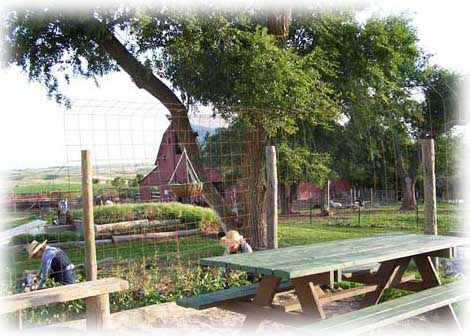|
|
Many people today are moving back to rural living, keeping goats, and interested in doing things the more natural way. They start asking; "What about herbal benefits in goatkeeping?"
The answer is "Yes!" Herbs and goats go together like sunshine and summertime. And it's not hard to do, most herbs are hardy plants that can be grown along a fence row, or snuck in among the flowerbeds, as at right. The mullien in the middle serves as an accent piece for this small bed, and provides healthful benefits in its large fuzzy leaves and small yellow flowers.
|
Ever wonder why goats love rose bushes? Well, that may be a smarter move than you think upon discovering your grandmother's bush has been drastically pruned. In fact, roses are also an herb. Although the part used by human herbalists is the rose-hip, (or fleshy seed pod.) The hips have been well known for centuries for multiple uses... notable among its properties is the very high vitamin C content. Maybe you should try it?
And on top of everything else, as browsers, goats are designed for high intakes of woody stems, twigs, bushes and barks. So nearly all shrubs are actually quite good for their systems.
There are a few plants, however, to steer clear of. Lillies of the Valley are among them. For better lists, see the Links page.
|
|
The three most often recommended "must have" healing herbs are Comfrey, Yarrow, and Calandula. These three are quite powerful for healing anything, and I've heard of one lady who keeps a bottle handy with handfulls of these three set in olive oil; which she uses as a first aid salve on any cuts, abrasions or lacerations any of her animals, (or humans!) get.
Tidbit: An old name for Comfrey is 'Boneknit', and it is very high in calcium. Little goats love to nibble on the young shoots. The matured leaves are stronger and can be a bit prickly.
|
|
There is a lot of information out there on all these plants, and it pays to do your research on these things. (Many times using herbs can prevent problems, but sometimes if things are really bad, a chemical solution is the best decision.)
We also grow Wormwood, which is a strong parasitic. At times our goats will go crazy over it, and it will taint the flavor of the milk, so we do limit consumption! It is great to give to pregnant does after they've dried off, it is also good for all female problems, including reproductive. And a good general tonic.
|
|
Any information on herbs in goatkeeping would be remiss if it failed to mention Raspberry Leaves. They are highly praised as absolutely The Best in helping out with any pregnancy or birthing problems of goatkeepers everywhere... and, I shouldn't wonder, are equally effective with other species.
They are easy to collect yourself, simply gather the leaves and dry for use in the winter months. Even a handful added on top of their grain is very effective, and the does love the taste so lick it right up. Unlike Wormwood, there are no unpleasant flavors to taint the milk, so milking does can be fed this in as much quantity as you can muster. An all-around miracle herb for those who have trouble with hard-kidding does.
|
It is easy to get your start in herbs, and once going, most herbs require little fussing over. They will however need protecting at the start, both from wild animals and your own! When first getting a foothold in their new spot, they are suseptible to being easily 'over grazed' by a few minute's nibble by deer, goats, or sheep. So keep them in the yard, or some other fenced in place.
Rabbits aren't usually much of a problem, as herbs are not usually succulent, and those little nibblers tend to go for sweet stuff.
This is only a scant overveiw of the first herbs to have. There are so many more, it would take a book! In fact there are many books out there, and we recommend gathering several and cross referencing between them. Each has something to offer, and each its own perspective. Also, be sure to talk to folks who use them, (both books and herbs,)... you can save a lot of time with that shortcut! |
|
Then Misty's second litter, by Geronimo, and Mom requested the "River" girl kept back from there. So River Song went to be Mom's dog. ("She gardens with me" Mom used as backup.)
So... everyone here had a Tervuren but me. (Except Dad, but he's not so much a dog lover!)
For the last litter Misty had for us, we got her bred to TK Look At The Radar, before he wen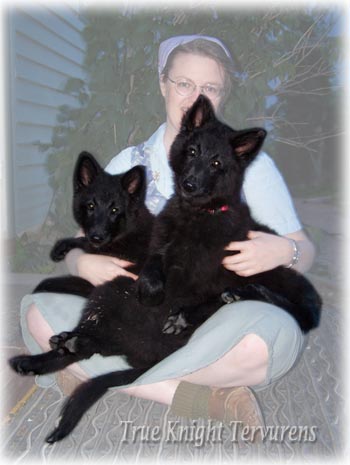 t to Colorado. I especially wanted a black Misty-girl for the program, the last genetic match we had available to pair Misty's valueable old lines with, and hoping for a black female to provide an alternative to Fiona, just in case. t to Colorado. I especially wanted a black Misty-girl for the program, the last genetic match we had available to pair Misty's valueable old lines with, and hoping for a black female to provide an alternative to Fiona, just in case.
So Misty's third daughter to join us turned out to be two black little girls, impossible to choose between. We kept them for a year, and then the bigger one "de-selected" herself by being unwilling to give up looking at chickens with a certain gleam in her eye.
Contacted by a previous puppy mom who was now completely under the spell of this amazing breed, we sent the bigger girl home with her to continue to safeguard the line, and kept "Empress". (Red collar at right. > )
Where her sister had shown a marked preferrence for Abi over me, Empress seemed to be the opposite, and while it's unkind to crow over something like that, I did feel the least bit flattered that I'd been "taken a shine to".
Not knowing which was going to stay, though, I had distanced my heart a little from them in their puppy stages, and while Empress has clearly shown since that she is mine according to her, I missed out on that "puppy love" stage while trying to be wise.
Feeling that we'd capitalized on the available genetics, I didn't intend to do any more puppy-keeping.
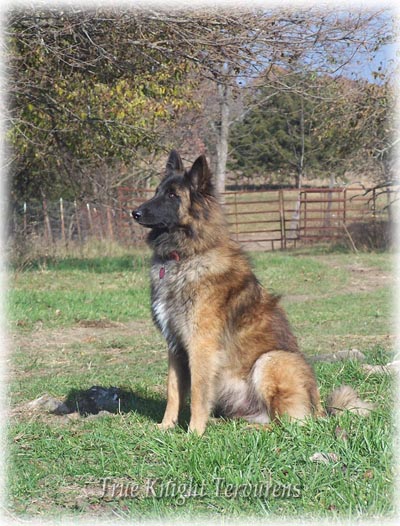 Then Luna had her second litter out of Geronimo... and there was a little girl there that was outstanding in every way. As much as I wanted to just stay with the status quo for a while, everyone who was around this little girl advised she be kept and watched because she was something really special. She had so much bone that we couldn't tell her apart from her brother, and for a breed with marked gender differences that was an amazing amount of solidarity in a female. So "TK Fox In The Grapes" became my second female... and I'm very excited about where she might end up! Lots of herd drive, we'll see where her opportunities lie. Then Luna had her second litter out of Geronimo... and there was a little girl there that was outstanding in every way. As much as I wanted to just stay with the status quo for a while, everyone who was around this little girl advised she be kept and watched because she was something really special. She had so much bone that we couldn't tell her apart from her brother, and for a breed with marked gender differences that was an amazing amount of solidarity in a female. So "TK Fox In The Grapes" became my second female... and I'm very excited about where she might end up! Lots of herd drive, we'll see where her opportunities lie.
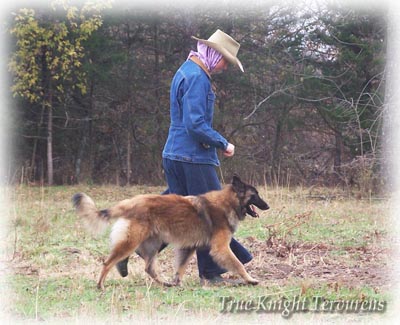
|


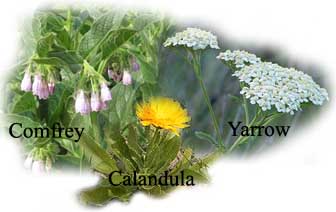
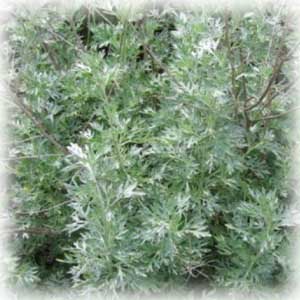

 t to Colorado. I especially wanted a black Misty-girl for the program, the last genetic match we had available to pair Misty's valueable old lines with, and hoping for a black female to provide an alternative to Fiona, just in case.
t to Colorado. I especially wanted a black Misty-girl for the program, the last genetic match we had available to pair Misty's valueable old lines with, and hoping for a black female to provide an alternative to Fiona, just in case. Then Luna had her second litter out of Geronimo... and there was a little girl there that was outstanding in every way. As much as I wanted to just stay with the status quo for a while, everyone who was around this little girl advised she be kept and watched because she was something really special. She had so much bone that we couldn't tell her apart from her brother, and for a breed with marked gender differences that was an amazing amount of solidarity in a female. So "TK Fox In The Grapes" became my second female... and I'm very excited about where she might end up! Lots of herd drive, we'll see where her opportunities lie.
Then Luna had her second litter out of Geronimo... and there was a little girl there that was outstanding in every way. As much as I wanted to just stay with the status quo for a while, everyone who was around this little girl advised she be kept and watched because she was something really special. She had so much bone that we couldn't tell her apart from her brother, and for a breed with marked gender differences that was an amazing amount of solidarity in a female. So "TK Fox In The Grapes" became my second female... and I'm very excited about where she might end up! Lots of herd drive, we'll see where her opportunities lie.
